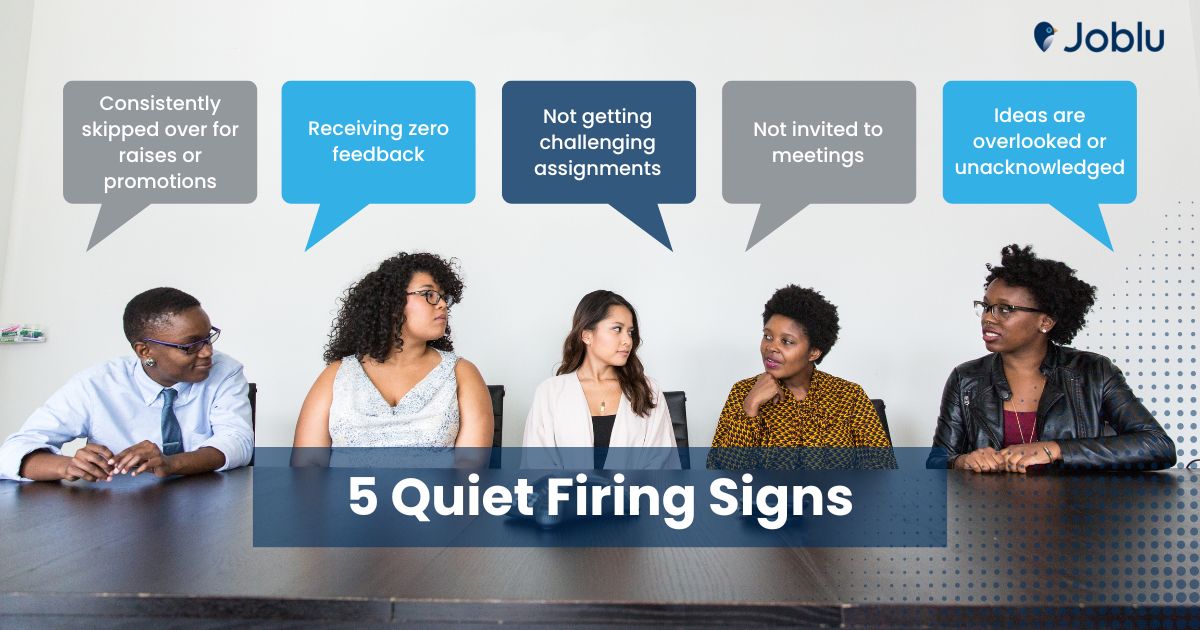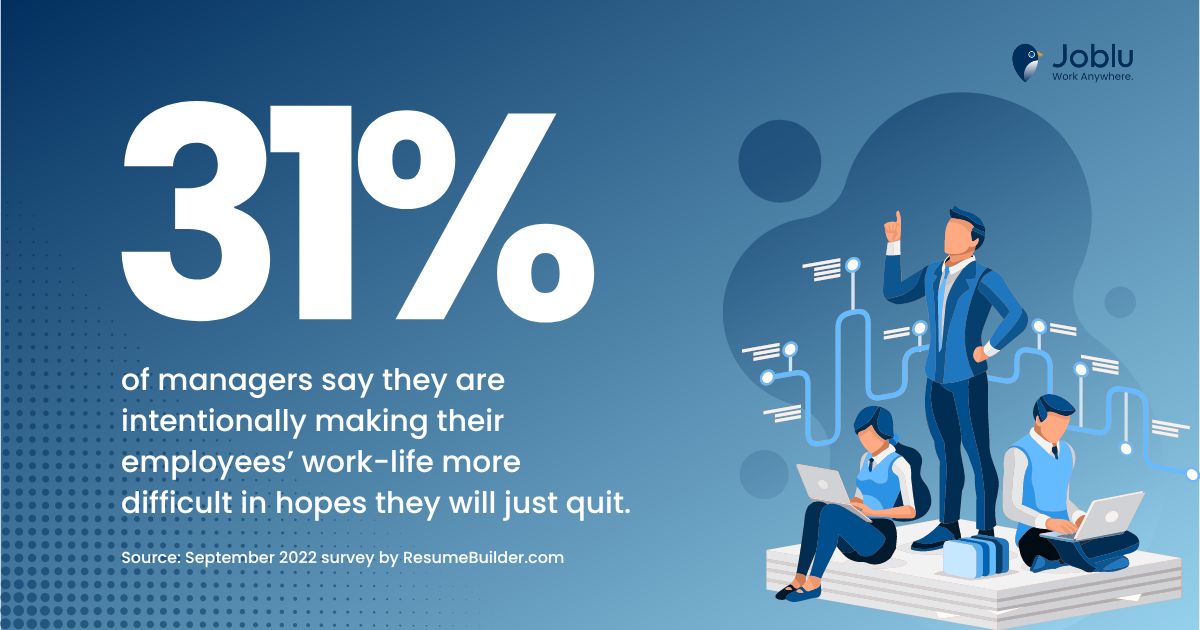The concept of “quiet quitting” has recently gained notoriety, sparking discourse among employees — is working within one’s job hours and job description a sign of a bad worker, or is it only reasonable?
Now, we have the term quiet firing. Judging by the coined phrase, it sounds like a reverse type of workplace practice that’s seemingly in response to quiet quitting. However, upon closer inspection, it looks like it may not be as unusual or novel as we expect.
In this article, we’ll look at this workplace phenomenon: what is quiet firing and what drives company management to do it? We’ll also enumerate five quiet firing signs, and what to do if you’re on the receiving end of this bad managerial tactic.
Table of Contents
What is Quiet Firing?
Quiet firing is a newly coined phrase that gained popularity through social media influencer DeAndre Brown. He was one of the first people to mention quiet firing on social media where his TikTok post went viral. In the 42-second post, Brown succinctly described the practice as “living up to your job responsibilities” and yet never getting a raise or promotion.
Quiet firing is similar to quiet quitting in the sense that they are both passive-aggressive practices in the workplace. Instead of directly reprimanding or firing an employee, a manager will make the employee’s work life as unpleasant as possible, enough to force the person to quit voluntarily. Managers who are afraid of direct confrontation commit this either subconsciously, or deliberately by those who simply want to avoid having tough conversations. In the viral TikTok post, Brown equates quiet firing as a response to quiet quitting. But based on the conversations among workers that followed, it seems like it can happen to any type of worker, as long as a manager either has bad communication skills or does not favor them.
5 Quiet Firing Signs to Look Out For

If you’re feeling undervalued or restless in your organization, you may actually be on the receiving end of quiet firing tactics. If you can’t pinpoint exactly what is happening to you in your workplace, here are a few more quiet firing signs you should look out for:
1. You’re consistently skipped over for promotions or raises
This is the most common quiet firing sign among workers who feel compelled to quit their jobs. In a recent Pew Center Research study, the majority of workers cite “low pay” and “no opportunity for growth” as their top reasons for quitting. If you’ve been performing well with a company for over one to two years, expecting a raise or promotion is only well within your rights.
2. You’re not being given any feedback — positive or negative
Any type of feedback is necessary in the workplace: the positive type for a morale boost and the negative type for one’s growth and improvement. If you’ve been feeling neglected in your job, it may be because you don’t receive any type of feedback on your work.
3. You’re not getting challenging assignments
Leveling up on your work requires receiving challenging tasks. It’s the ultimate type of positive feedback because it implies your manager’s trust in your abilities. The opposite is a tacit assertion that your manager feels you’re not capable of leveling up.
4. You’re not getting any invites to important meetings
If your manager avoids having you in meetings, you could end up feeling insignificant and unneeded in your team. Similarly, if your manager avoids talking with you, work-related or otherwise, they could be trying to avoid bigger-picture conversations.
5. Your ideas are overlooked, disregarded, or unacknowledged
Feeling overlooked and disregarded for your ideas is another type of indirect negative feedback utilized by quiet firing managers, making you feel that your thoughts add no value to the team.
How to Deal With Quiet Firing

If you’ve felt any and most of the quiet firing signs we’ve enumerated above, it’s time to face the truth and deal with your current workplace reality. Here are a few ways you can deal with quiet firing:
Talk to your manager
If your manager won’t talk to you, there’s no use waiting for it to happen, especially if they’re doing it on purpose. Assert your right to give feedback and try your best to schedule a time with them.
If your boss won’t touch base, raise it with HR
Presuming that your manager is indeed trying to quiet fire you, touching base with them on a one-on-one basis will be hard. If they really can’t squeeze you in for one reason or another, take it up with HR.
Look for advocates among workmates and colleagues
Similar to talking to HR, having your team’s support could help you reach out to your manager more effectively. Discussing with colleagues what’s happening to you in the workplace could open up bigger conversations, allowing you to foster better camaraderie and teamwork.
Know your worth
When talking with your manager, you should familiarize yourself with the protocols for promotions, raises, and pay scales for your role so you know exactly what you’re asking for. Also, be ready with a factual record of your accomplishments at work to let them know you’re well within your rights with what you’re demanding.
As a worker, you have every right to speak up when you feel that you’re being unfairly treated in the workplace, quiet firing or not. Remember, speaking up is not needless complaining. It’s only a proper assertion of your rights as an individual and employee. Keeping your feelings of dissatisfaction could lead you to feel burnt out, anxious, and depressed, which won’t be helpful in the long run. No job is worth sacrificing your mental well-being.
If you’re ready to move forward to a healthier workplace, find your next job on the Joblu app. Here at Joblu, we value your well-being and career goals. We strive to help you find meaningful jobs by connecting you to a roster of agencies and employers we’ve screened, vetted, and verified. No need to worry about your safety and well-being during your job search. Joblu makes the entire job application process easy and intuitive for you. A single swipe can take you one step closer to your dream job.
Frequently Asked Questions About Quiet Firing
Q: Can you get fired for quiet quitting?
A: If you’re on the extreme end of quiet quitting and basically neglecting your job beyond the bare minimum, then your performance could be grounds for dismissal. However, if you’re simply applying work-to-rule in the way you’re performing work — meaning if you’re working within your defined job hours and within your job description only — employers can’t reasonably use that as grounds for your dismissal.
Q: What is quiet firing? How do you tell if you’re being quiet-fired?
A: Bad communication skills are at the heart of why managers quiet fire employees. To avoid the hard conversation, managers trying to quiet fire an employee will make them feel as uncomfortable as possible until the employee can’t take it any longer. If you’ve been feeling overlooked and unnecessary in your team or if you’re feeling dissatisfied with your pay and growth opportunities, then you could be on the receiving end of quiet firing.
Q: Do I resign or get fired?
A: Resigning is better for your work reputation, but it doesn’t entitle you to the same unemployment benefits that you could receive if you’re dismissed. Getting fired, on the other hand, is harder to explain if you’re looking for another job and could damage your reputation unless you have proof that you were wrongfully fired or dismissed. It does entitle you to benefits, which could help tide you over while you look for another job.
If you’re thinking about whether to resign or wait for termination, reflect and be honest with yourself about what you can reasonably handle. Can you handle waiting for a termination letter so you can avail yourself of your benefits or, would quitting be better for your mental health? Can your industry reputation handle the fact you were fired or would resigning be better for your career status?
Q: Will future employers know I was fired?
A: Employers typically do background checks on prospective employees, so there’s a chance they will know. If you were fired for bad performance, no need to mention it to your new employer if they don’t bring it up. However, make sure to use your new job as an opportunity to recover your reputation.
Q: Why do the best employees quit?
A: The best employees can quit for several reasons. They could be feeling dissatisfied with their pay within the company. They could feel overworked yet unappreciated. They could also feel restless performing the same jobs without seeing any opportunities for growth. They could likewise be frustrated with the company culture.